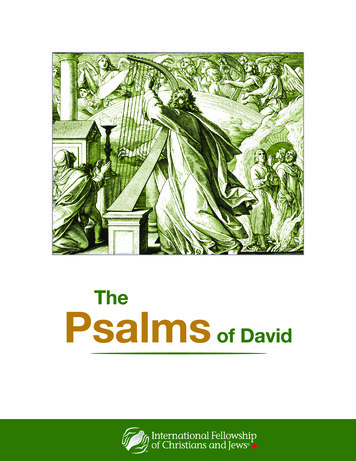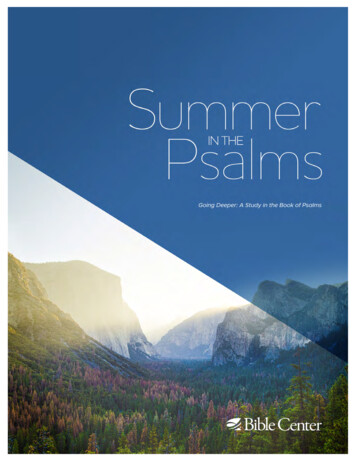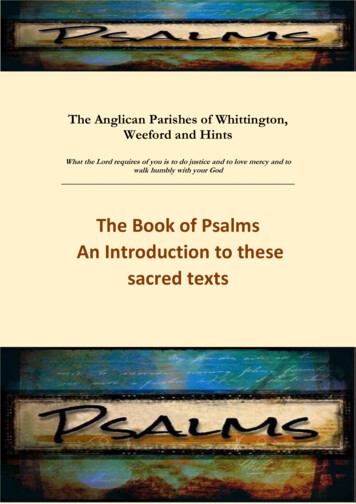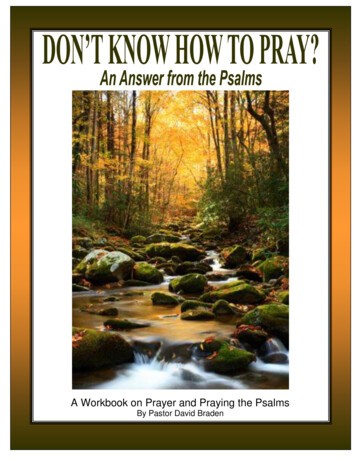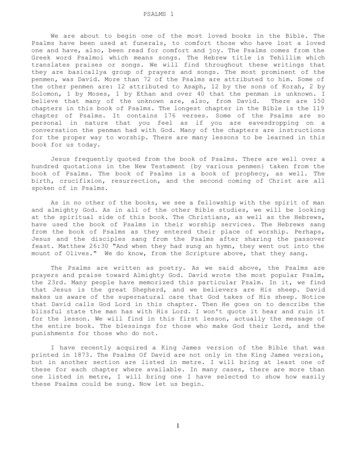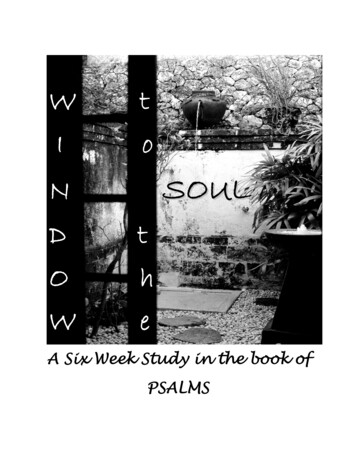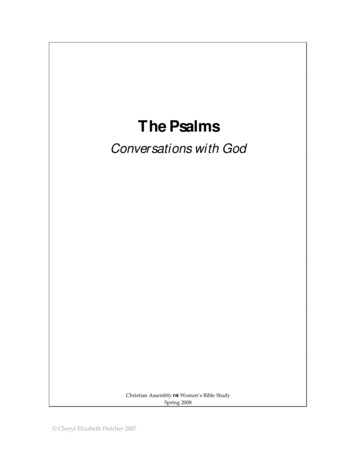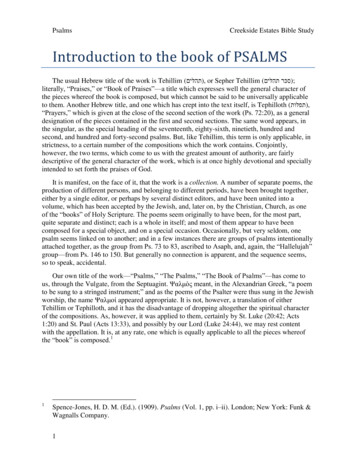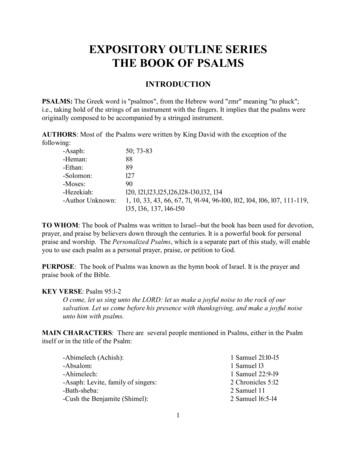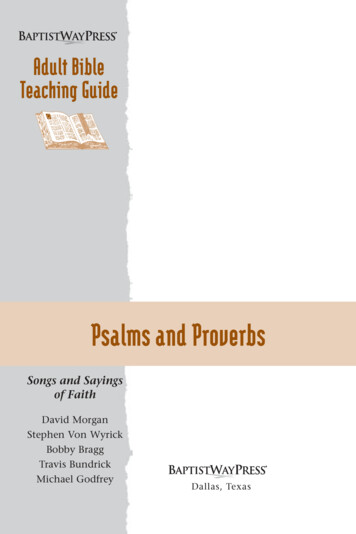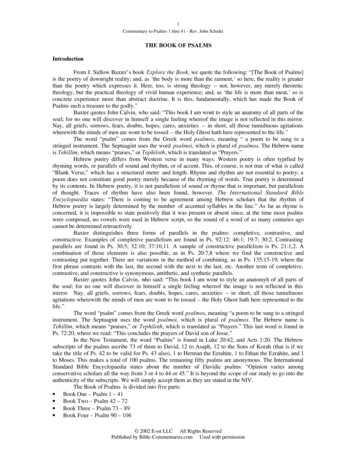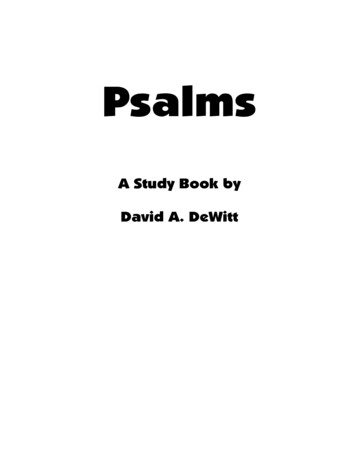
Transcription
!Psalms!!!!!!A Study Book byDavid A. DeWitt!
Our PurposeRelational Concepts has been organized to provide motivational instruction for menand women interested in being used by God.We believe that Christian doctors, mechanics, housewives, realtors, lawyers,secretaries, plumbers, businessmen, etc. are the most effective spokespersons thechurch has.These people are generally not in a position where they can take the time to go to aBible college. Our purpose is to bring quality instruction to them, where they are, tobe applied in their families, churches, businesses, and schools—the communities inwhich they live.PUBLICATIONSP. O. Box 88095Grand Rapids, Michigan 49518-0095relationalconcepts.orgThis study book was compiled by David A. DeWitt—a graduate of Michigan State University(B.S.) and Dallas Theological Seminary (Th.M., D.Min.). David is an Equipper and Discipler in theRelational Concepts’ School of Discipleship. He is married to Ellen. They have three marrieddaughters and nine grandchildren.The cover photo is of a painting of “King David Playing the Harp” by Gerrit van Honthorst (1590-1656). It is displayedat the Central Museum, Utrecht, Holland.Unless otherwise noted, all Scripture is taken from the NEW AMERICAN STANDARD BIBLE, 1960, 1962, 1963,1968, 1971, 1972, 1973, 1975, 1977, by the Lockman Foundation. Used by permission.2
Table of ContentsIntroduction . 4Psalms 1 – 2 . 6Questions for Discussion . 6Psalms 3 – 12 . 7Questions for Discussion . 9Psalms 13 - 23 . 10Questions for Discussion . 13Psalms 24 – 35 . 13Questions for Discussion . 16Psalms 36 – 47. 16Questions for Discussion . 20Psalms 48 – 58 . 20Questions for Discussion . 23Psalms 59 – 71 . 23Questions for Discussion . 26Psalms 72 – 83 . 27Questions for Discussion . 30Psalms 84 – 95 . 30Questions for Discussion . 33Psalms 96 – 107 . 33Questions for Discussion . 37Psalms 108 – 118 . 37Questions for Discussion . 40Psalms 119 – 132 . 40Questions for Discussion . 43Psalms 133 – 143 . 43Questions for Discussion . 46Psalms 144 – 150 . 46Questions for Discussion . 483
IntroductionThe Structure of the BookThere are five collections included in Psalms: Book I is Psalms 1–41, Book II is Psalms 42–72, Book III is Psalms 73–89, Book IV is Psalms 90–106, Book V is Psalms 107–150.Each book concludes with its own doxology, and Psalm 150 is a doxology to the whole collection. This five-book formcomes from the Dead Sea Scrolls and is only the final form of the Psalm. The Psalms were gradually collected overabout a thousand years, from Moses (mid-1400s BC) to Ezra (mid-400s BC), although most of them were written by andaround the time of David (1000 BC). This final form shows the work of one single collector. Most likely it was Ezra,since he probably finalized much of the form of the Old Testament (Nehemiah 8:1-8).Authorship of the PsalmsOf the 150 Psalms, 100 of them have designated authors. They are:DavidAsaphSons of KorahSolomonEthanHermanMoses731210211137 in Book 1; 18 in Book 2; 1 in Book 3; 2 in Book 4; 15 in Book 5Psalms 50 and 73-83Psalms 42, 44-49, 84, 85, 87Psalms 72,127Psalm 89Psalm 88Psalm 90Some of the 50 undesignated Psalms were clearly written by David (for example, Acts 4:25 says David wrote Psalm 2).So we can safely say that David wrote at least half of the Psalms. David, being a musician and interested in music, hadthe Psalms put to music for the national Choir Director (mentioned 55 times). Determining what the music and metersounded like is an exercise in speculation, so we won’t go there. We do know that the Psalms were often sungaccommpanied by musical instruments. Cymbals, timbrels, wind and stringed instruments of various types arementioned.When and where the choir sang is also not clear. The choir is connected with the house of God, but the Temple was notin existence at David’s time. David housed the Ark of the Covenant in a tent in Jerusalem near his own palace (2 Samuel7:2). [The Ark was in Shiloh for 400 years, lost to the Philistines, returned to Kiriath-jearim, then put in the house ofAbinadab until it was brought to Jerusalem by David (1 Samuel 7:1ff).] This tent near David’s house in Zion is probablywhat is meant by the house of God (2 Samuel 7:6). The choir probably sang the Psalms there, and for the seven holidaysdesignated by the Mosaic Law (see 1 Chronicles 6:31-32; 13:8; 15:3-28; 16:4-43; 23:1-5; 25; 2 Samuel 6:5).The Psalms are a collection of songs not named in the Old Testament. The Jews referred to it as “The Book of Praises,”while the Septuagint (the Greek translation of the Hebrew Old Testament done in 250 BC) called it “The Book ofPsalms.” The Greek word means “songs sung to the accompaniment of stringed instruments.”Fourteen Psalms Have Historical NotationsPsalm 3 seems to be connected with 2 Samuel 15–18, when David fled from Absalom.Psalm 7 may be related to 1 Samuel 23:24–29, concerning the words of Cush the Benjamite.Psalm 18 is almost identical to 2 Samuel 22, the day God delivered David from his enemies.Psalm 30, with 1 Chronicles 21:1–22:1, may be written by David for the dedication of the Temple.Psalm 34 is with 1 Samuel 21:10–22:2, when David pretended madness before Abimelech.Psalm 51 is based on the incident of David’s sin over Bathsheba, recorded in 2 Samuel 11–12.Psalm 52 is with 1 Samuel 22:9, when Doeg the Edomite warned Saul about David.Psalm 54 is with 1 Samuel 23:15-23, when the Ziphites warned David about Saul.Psalm 56 is connected with 1 Samuel 21:10-15, when the Philistines captured David in Gath.Psalm 57 may be related to the incident at Adullam (1 Samuel 22:1-2) or at En Gedi (1 Samuel 24)4
Psalm 59 is connected with 1 Samuel 19:11, when Saul tried to kill David.Psalm 60 is from 2 Samuel 8:3-13, David’s battle with Mesopotamia and Syria.Psalm 63 may be related to 2 Samuel 15:23, when David was in the wilderness of Judea.Psalm 142 may be from 1 Samuel 22:1 or 24:3, another passage that reports David being in a cave.Different Numbering of Some PsalmsThe numbering of the Psalms in the Greek Septuagint (LXX) text is a little different from theHebrew text. This could be important when using Roman Catholic commentaries. The list onthe right shows the differences.Poetic Parallelism in the PsalmsHebrew poets do not use rhyme as we often do. Instead, the Hebrew poet states an idea in thefirst line, and then reinforces it by various means in the succeeding line or lines. Parallelismincludes: Synonymous parallelism, where the next lines repeat the idea of the first (3:1). Antithetic parallelism, where the second line is the opposite of the first (1:6). Synthetic parallelism, where the succeeding lines add to or develop the first (1:1-2). Emblematic parallelism, where the next lines elevate the thought of the first (42:1).Personal, Emotional, and IndividualIn his commentary on Psalms (“Bible Knowledge Commentary”), Ron Allen said:Of all the books in the Old Testament the Book of Psalms most vividly represents the faith of individuals in theLord. The Psalms are the inspired responses of human hearts to God’s revelation of Himself in law, history, andprophecy.The Psalms are, in a sense, the opposite of Proverbs. Proverbs begin with the fear of God and look down at life here onearth, concluding how to live wisely. Psalms begin with the situation of the author here on earth and look up towardGod, concluding something about the character of God.The Psalms were written while Israel was under the Mosaic Law. But the Law is corporate, the Psalms are individual.The Law is logical, the Psalms are emotional. The Law is about commands, statutes, and ordinances, the Psalms areabout facts, faith, and feelings. The Law is about obeying God, the Psalms are about experiencing God. The Psalms arepoetic, not judicial, real not mystical, personal not societal, and coming from the heart and soul of a believer seekingGod. The Law is from God to man, the Psalms are from man to God.Thoughts and ApplicationsPsalms are emotional poetry. Most of the judges and the kings were, what we might call, goal-oriented. Even Christ andthe apostles worked from an objective. Jesus came to reveal the nature of the Kingdom of God and pay for our sins. Theapostles had a mission, to make disciples of all nations. As we read about Peter and Paul, they seem to be driven by anobjective. If we study the prophets of Scripture, they are not so much goal-oriented as obedience-oriented. They aregiven a revelation from God, and they are determined to write it down, or declare it to the people, or the churches, orwhatever God directed them to do with it.But the psalmists are different. The psalmist is not particularly goal-oriented or obedience-oriented. (Of course, allbiblical authors have some goal and are obedient to God, but I’m talking about the structure or their writing.) Thepsalmists are experiencing something about life with no goal or objective except to share their struggle and how it ledthem to a deeper understanding of God—His heart, His works, His attributes, His will. The psalmist brings us into hislife situation on an emotional level. As we feel what he feels, we join with him in finding an answer in the character ofGod. It’s more about joining his experience and learning from the experience than it is about accomplishing any goal orobjective. His experience is emotional, though not illogical. He invites us with him into his feelings, from the way thingsactually are, to the God who is actually there.5
Psalm 1 — What the Blessed Man DoesTheme: The blessed man (subject) delights in the law of the Lord(complement). [The Hebrew for blessed is plural and means, Oh, how1:2 But his delight is in the law of the LORD,very happy! (“Ryrie Study Bible,” p. 832.).]And in His law he meditates day andnight.Author: unknownHistorical Setting: unknownKey Passage: verse 2Structure: The major division is between verses 3 and 4. In verses1-3, the blessed man knows enough not to walk withthe wicked sinners and scoffers because he delights in the Mosaic Law. The result is, he becomes metaphorically like afruitful, strong, well-watered tree. In verses 4-5, the wicked are metaphorically like chaff because they will not stand, inthe sense of withstand, the judgment of God. The assembly of the righteous may refer to a heavenly assembly. Verse 6speaks of both men in the context of certain judgment.Thoughts and Applications: This Psalm tells us that some people are like a tree, some like chaff. The ones who livelike trees are rooted in the Word of God, and they avoid the chaff.Psalm 2 — The Lord’s Anointed KingTheme: The Lord’s Anointed (subject) rules over the nations(complement).2:7 “I will surely tell of the decree of the LORD:He said to Me, ‘You are My Son,Author: David (Acts 4:25)Today I have begotten You.Historical Setting: David’s thoughts about the Lord’s Anointed,possibly when he became king in Zion/Jerusalem (2 Samuel 5:1-9).The other royal Psalms are 18, 20–21, 45, 72, 89, 101, 110, 132, and 144.Key Passage: verse 7Structure: The major division is between verses 3 and 4. Verses 1-3 tell us that the M¡Iywøg (Goyim), nations or Gentiles orunbelievers, are in an uproar. But why would they care about a king in Israel? Because if Israel’s God is the only God,then Israel’s king is the only king. The rulers take counsel together against His Anointed One (AjyIvDm, Messiah, which inGreek is cristo/ß, Christ). Today I have begotten You is a metaphor for God’s decree to install His king in Jerusalem.The New Testament also uses this phrase in reference to Christ’s resurrection (Acts 13:33-34; Romans1:4; Hebrews 1:5;5:5). Like many prophetic passages (Isaiah 14 and Daniel 11), this begins with a historical figure (the coronation ofDavid) and ends with a future person (Jesus Christ reigning during the Millennial Kingdom). The final future outcome iswhat the nations dread. They will all worship the Lord with reverence.Thoughts and Applications: This Psalm tells us that most unbelievers, most of today’s secular, worldly, entertainers,educators, journalists, politicians, social and religious leaders will hate Jesus Christ and His followers. They will be in anuproar, devise vain things and counsel together against the Lord’s anointed (literally the Messiah or Christ). Davidasked: “Why do they do that?” And the answer is because Christ is the only God, and they will all be forced one day toworship the Lord with reverence (verse 11).Questions for DiscussionTrue or False?1.2.3.4.5.6.7.8.The Psalms were written over a thousand years, and gathered together in five books.The Psalms, as we have them, are generally in chronological order.Psalms are different from Proverbs, in that Psalms begin with a human situation on earth.Psalms are personal, individual, emotional, and experiential, yet logical and reasonable.The Psalms assume the people are living under the Mosaic Law.In Psalm 1, the word for Anointed is “Messiah” or “Christ.”The assembly of the righteous in Psalm 1:5 refers to the Temple, not synagogues.In Psalm 2:7, the phrase today I have begotten You is about God the Son coming from God the Father and,therefore, being of the same nature as God.Answers: (1) True. (2) False (For example, Psalm 90 is the oldest.) (3) True (The Psalms begin with man and end with God. Proverbs begin withthe fear of God and move toward wisdom on earth.) (4) True. (5) True. (6) True. (7) False (The context is the assembly of the righteous standingbefore God in judgment.) (8) False (This is a metaphor about David being crowned as king.)6
Psalm 3 — When “They” Say There Is No DeliveranceTheme: When there seems to be no deliverance from the Lord(subject), depend upon the Lord (complement).3:2 Many are saying of my soul,Author: David“There is no deliverance for him in God.” Selah.Historical Setting: when David fled from his son Absalom3:3 But You, O LORD, are a shield about me,Key Passage: verses 2-3My glory, and the One who lifts my head.Structure: The main division comes early, between verses 2 and3. The superscription through verse 2 tells us of David’s situation.He has been forced out of his palace by his son and a rebelling army. Many are calling his situation hopeless. Then thepivot—But You, O Lord. The Selah (a purposeful pause, which may also have been a musical interlude) after verse 2 isto emphasize, and anticipate, the answer of verse 3. The answer section divides into three statements: verses 3-4, 5-6, and7-8.Thoughts and Applications: We can notice a clear pattern in how David wrote. Very often he pictured his situation ashopeless, desperate, and on the edge of death or despair, then he found his hope in God. That is often our case in life.God seems to bring us to the edge, then He lets us hang over the edge before He catches us.Psalm 4 — The Man God Has Set ApartTheme: Sons of men (subject) know that God has set apart the godly man for Himself (complement).Author: DavidHistorical Setting: probably the same as Psalm 3, when David4:3 But know that the LORD has set apart the godlyfled from Absalom his sonman for Himself;Key Passage: verse 3The LORD hears when I call to Him.Structure: Verse 1 is a call to God. Verses 2-5 are addressedto the people who believe David is doomed by Absalom’srebellion. The Psalm’s major division is before 6-8, where David trusts God alone. Verse 2 points out the world’stechnique: to love what is worthless and aim at deception. But that will not destroy the man God has set apart forHimself (verse 3). That’s the main point of the Psalm. The world does not understand that God has set apart certainpeople for Himself. Next, David gave worldly people four statements of advice (in verses 4-5): Tremble, Meditate,sacrifice righteously, and trust in the Lord. The main phrase in the last section is in verse 7: You have put gladness in myheart. That’s what God does for the man He has set apart. [“The heart was considered the center of the immaterialaspects of life, such as emotions, thoughts, motivations, courage” (“Ryrie Study Bible,” p. 834)].Thoughts and Applications: Psalm 4 makes a significant point about the selectivity of God. Verse 3 says: the Lord hasset apart the godly man for Himself. It sounds something like Isaiah 66:2—But to this one I will look, to him who ishumble and contrite of spirit and who trembles at My word.Psalm 5 — The Character of God and MenTheme: The character of God (subject) reveals the evil of men5:4 For You are not a God who takes(complement).pleasure in wickedness;Author: DavidNo evil dwells with You.Historical Setting : unknown, possibly also during Absalom’s rebellionKey Passage: verse 4Structure: In verses 1-3, David asked God to give attention to his morning prayer. Verses 4-6 are the definingparagraph, where David gave seven aspects of the moral character of God. In verses 7-8, David responded by worshipingGod and being led by God. In the last paragraph, verses 9-12, David contrasted the wicked and the righteous andconcluded that God blesses the righteous and surrounds him with favor as with a shield.Thoughts and Applications: Psalm 5 tells us a lot about the character of God by what God hates. Notice the list (ofseven things) includes boasting. God does not want us to speak about how good we are, or about our accomplishments.The list also includes bloodshed. This is not military bloodshed for a just cause. On certain occasions, God ordered thatfor Israel. Nor is it capital punishment. God ordered that, too (Genesis 9). It is about an individual taking the life ofanother individual, even to carry out justice.Psalm 6 — Prayer In the Midst of DismayTheme: The repentant sinner (subject) should appeal to thegrace of God (complement).Author: DavidHistorical Setting: unknownKey Passage: verse 26:2 Be gracious to me, O LORD, for I am pining away;Heal me, O LORD, for my bones are dismayed.7
Structure: Psalm 6 has only one division, between verses 7 and 8. The first part appeals to God, the second partaddresses evildoers.Thoughts and Applications: This is the first of seven penitential or confession Psalms (6, 32, 38, 51, 102, 130, 143). Inthese Psalms, the author is confessing sin and begging for God’s forgiveness. Notice that David asked for the grace ofGod, but unlike the previous Psalms, he did not declare that he would receive it because God never promised grace to theindividual in the Old Testament. His appeal was based upon the God’s lovingkindness and that in Sheol, who will giveYou thanks? The idea seems to be that David could not praise God as a flesh-and-blood man if he was dead. Psalms 6and 7 are interesting in that they come from the opposite spiritual position. Psalm 6 is one of several confession Psalms,where the author is guilty, looking for forgiveness.Psalm 7 — Vindication for the RighteousTheme: The innocent (subject) need to be vindicated by God7:10 My shield is with God,(complement).Who saves the upright in heart.Author: DavidHistorical Setting: This was most likely during the time David washunted by Saul’s men (1 Samuel 22:8; 24:9; 26:19). Cush the Benjamite is not mentioned elsewhere but was probablyone of Saul’s men (Saul also being a Benjamite—1 Samuel 9:21).Key Passage: verse 10Structure: This is called a Shiggaion, a strange word, which some say means a poem of intense feeling or one to besung to emotionally stimulating music. In verses 1-2, David stated his dependence upon God for deliverance. In verses 35, David declared his innocence. In verses 6-17, David was assured of God’s vindication. The last verse, stands apartfrom the rest in some of David’s Psalms. I have not listed these benedictions as a separate paragraph.Thoughts and Applications: This Psalm is where the author is innocent, looking for vindication. It seems odd becausewe are sinners, and in every situation, we do something wrong. Yet David made his appeal to God based on the fact thathe was innocent of the specific things he was being accused of.Psalm 8 — The Majesty of GodTheme: God’s majestic creation (subject) is ruled over by man8:6 You make him to rule over the works(complement).of Your hands;Author: DavidYou have put all things under hisHistorical Setting: unknown. A Gittith (in the prefix) is probably a typefeetof music from Gath.Key Passage: verse 6Structure: The Psalm has two main paragraphs bracketed by the phrase O LORD, our Lord, How majestic is Your namein all the earth, at the beginning (verse 1) and the end (verse 8). The main division is between verses 4 and 5. First,David marveled over God’s creation, including man (verses 1-4). Then he told us that man has been given a certainmajesty of his own from God to rule over God’s creation (verses 5-9). Verse 9 is the closing benediction.Psalm 9 — A Song of Thanksgiving for VindicationTheme: God as a judge (subject) will vindicate His people (complement).Author: DavidHistorical Setting: unknown. Muth-labben (in theprefix) means death of (or for) the son, but we don’t9:7 But the LORD abides forever;know the significance of that.He has established His throne for judgment,9:8 And He will judge the world in righteousness;Key Passage: verses 7-10. We could say verse 8 aloneHe will execute judgment for the peoples with equity.is the key verse but these 4 are tied together.9:9 The LORD also will be a stronghold for the oppressed,Structure: Verses 1-6 speak of what God has done.A stronghold in times of trouble;Verses 7-10 talk about what God will do. Verses 11-189:10 And those who know Your name will put their trust in Youtell us about how God responds to various groups.Verses 19-20 call for God to judge the (unbelieving)nations.Thoughts and Applications: Psalms 9 and 10 were clearly meant to be sung together. The Septuagint makes them thesame Psalm because together they form an alphabetic acrostic in the Hebrew text. Each alternate verse (for the most part)begins with the next successive letter of the Hebrew alphabet. But they are separate Psalms because their themes aredifferent.8
Psalm 10 — The Power of the WickedTheme: The wicked (subject) operate as if “There is no God”10:4 The wicked, in the haughtiness of his(complement).countenance, does not seek Him.Author: David (because of the close association to Psalm 9)All his thoughts are, “There is no God.”Historical Setting: unknownKey Passage: verse 4Structure: The first verse stands alone as a question David put to God. Why do You hide Yourself in times of trouble?Then in verses 2-11, he described what the wicked are like, what they are thinking, and who they are oppressing. Finally,in verses 12-18, David came back to where he started and appealed to God to get involved and help those afflicted by thewicked.Thoughts and Applications: This Psalm is fascinating in that it tells us that the wicked actually are functioning as ifthere is no God. Romans 1 seems to say that there are no real atheists. But Psalm 10 tells us that there are a lot of peoplewho function as atheists. [A true atheist is a naturalist, a phony atheist just hates God.]Psalm 11 — Fleeing from DangerTheme: When tempted to flee from danger (subject), cling to the Lord11:4 The LORD is in His holy temple; the(complement).LORD’S throne is in heavenAuthor: DavidHis eyes behold, His eyelids test theHistorical Setting: not stated, but probably one of the times Saul wassons of men.trying to kill David (1 Samuel 18:11; 19:10)Key Passage: verse 4Structure: Verses 1-3 discuss the psalmist’s temptation to flee as a bird because his foundations are destroyed. But inverses 4-7, he turned to God because of three things: (1) The LORD is in His holy temple; (2) the LORD’S throne is inheaven; and (3) His eyes behold, His eyelids test the sons of men . the righteous and the wicked.Psalm 12 — The Words of Men and the Word of GodTheme: The false words of wicked men (subject) are destroyed bythe pure Word of God (complement).12:6 The words of the LORD are pure words;Author: DavidAs silver tried in a furnace on the earth,Key Passage: verse 6refined seven times.Structure: In verses 1-5, the words of wicked men made it seemlike faithful men had disappeared. The wicked used falsehood andflattering lips, and they thought, with our tongue we will prevail. That is, they don’t even consider telling the truth, theyjust use facts to “spin” them to say what they want. In verses 6-8, David saw the Word of God as prevailing in the midstof the lies of men.Questions for DiscussionTrue or False?1.2.3.4.5.6.7.8.9.In Psalm 3, David laid down and slept because he was exhausted from fleeing from Absalom.The historical setting of Psalm 4 is probably the same as Psalm 3.In Psalm 5:4-6, the seven things God opposes are: wickedness, evil, boastfulness, iniquity, speaking falsehood,bloodshed, and deceit.In Psalm 6, David declared that he would receive the grace of God.The main difference between Psalm 6 and Psalm 7 is that, in Psalm 6, David saw himself as guilty, and in Psalm7, he saw himself as innocent.In Psalm 8, we are told God has majesty, but man does not.Psalms 9 and 10 are actually the same Psalm.Psalm 11 tells us that God tests both the righteous and wicked.In Psalm 12, David said that God will preserve His own words.Answers: (1) False (He slept because he trusted God.) (2) True. (3) True. (4) False (He asked for grace but did not say he would receive itbecause, although grace was sometimes given to some individuals, grace was not offered to the individual in the Old Testament.) (5) True. (6) False(Verse 5 says of man: You crown him with glory and majesty.) (7) False (They are meant to be sung together, but they have a very different theme.)(8) True (verse 5). (9) False (David said God will preserve the needy with His words.)9
Psalm 13 — How Long O LordTheme: Waiting on the Lord (subject) is believing in His13:1 How long, O LORD? Will You forget me forever?lovingkindness (complement).How long will You hide Your face from me?Author: David13:2 How long shall I take counsel in my soul,Historical Setting: unknownHaving sorrow in my heart all the day?Key Passage: verses 1-2How long will my enemy be exalted over me?Structure: Four times David asked God How long it will bebefore God answers his prayer. It is not actually a question buta statement of agony and frustration. The main division of the Psalm is between verses 4 and 5, where David’s focuswent from his suffering to God’s lovingkindness. But notice that David never told us that God answered his prayer, onlythat He is a God of love, salvation, and in the past, He had dealt bountifully with David.Thoughts and Applications: In this Psalm, David showed us it is okay to complain to God if we are not doubting Hisfaithfulness or lovingkindness or goodness. Actually, God is the One we should complain to. By taking his complaint toGod, David was saying God is sovereign, and, therefore, ultimately responsible for our situation. The problem comeswhen we demand things from God and expect answers. For example, Job complained to God about not understanding hissuffering. But the only thing God reprimanded him for was doubting God’s sovereignty and trying to understand whatGod was doing in his life.Psalm 14 — There Is None Who Does GoodTheme: The whole human race (subject) has become corrupt(complement).14:3 They h
6 Psalm 1 — What the Blessed Man Does Theme: The blessed man (subject) delights in the law of the Lord (complement). [The Hebrew for blessed is plural and means, Oh, how very happy! (“Ryrie Study Bible,” p. 832.).] Author: unknown Historical Setting: unknown Key Passage: verse 2 Structure: The major division
